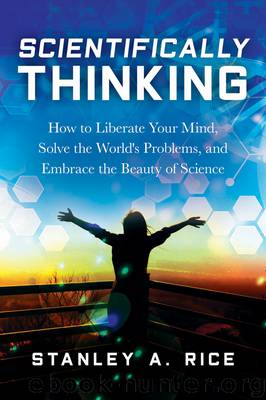Scientifically Thinking by Stanley A. Rice

Author:Stanley A. Rice
Language: eng
Format: epub
ISBN: 9781633884717
Publisher: Prometheus Books
One of the greatest sources of prestige for scientists is that our research is considered to be unbiased. This is why our statements carry more weight than those of politicians—not just because we are less likely to be dishonest (see the next chapter) but because we try our best to eliminate bias. Politicians recognize this. Even though each politician trumpets his own unimpeachable honesty, he also scoffs at the others. Therefore, politicians sometimes establish “nonpartisan” bodies to provide them with an unbiased summary of research into important questions.
An important example is the Congressional Research Service (CRS),1 a branch of the Library of Congress. When, for instance, Congress wanted to know in 2012 whether increasing taxes on the wealthiest Americans would harm the economy, they turned to the CRS. The resulting CRS report concluded that slightly higher taxes on the wealthy would not harm the economy. (They had to pay attention to the construct validity of the way they measured harm to the economy, of course.) What Congress does with this information is up to them. The Republican leadership of Congress chose to suppress this report when it first came out.2
Lest I make it sound as if I am dismissing bias as a moral flaw, peculiar perhaps to conservatives, let me set the record straight. Humans are always biased. All humans. Always.
One of the most important differences between a scientist and, say, a preacher is that the scientist is aware that he or she is biased and will take active measures to avoid bias. While a preacher might say, “The Lord spoke to my heart and said that we need to raise money so that I can have a private jet,” a scientist would feel obligated to give you evidence of her statement that you can independently verify. As I said in the introduction to the book, science tests hypotheses, using external information.
Much of science is an organized way of recognizing and eliminating bias. As I said before, science is a discipline. It is like a yoke by which oxen pull the cart of human knowledge forward. Oxen are prone to wander, to the right or to the left, but the yoke helps to prevent them from wandering as their biases might dictate.
Measurement techniques themselves can introduce bias, even if the experimenter does not have bias. Many data sets regarding bird migrations come from weekend bird-watchers. There simply aren't enough full-time bird-watchers to get all the necessary data. But, think about it, if full-time vs. weekend bird-watchers record arrival times of migratory birds—the date on which they saw the first scissor-tailed flycatcher in southern Oklahoma, for example—the dates from the weekend bird-watchers will be later than those of the full-time watchers. If a bird arrives on a Tuesday, as many do, the daily watcher will note the Tuesday date, but the weekend watcher will record it as the date of the following Saturday.
PARTICIPANT BIAS
Participant bias affects the reliability of the information provided by the participants in the experiment. Take, for example, stress.
Download
This site does not store any files on its server. We only index and link to content provided by other sites. Please contact the content providers to delete copyright contents if any and email us, we'll remove relevant links or contents immediately.
Enlightenment Now: The Case for Reason, Science, Humanism, and Progress by Steven Pinker(7306)
A Journey Through Charms and Defence Against the Dark Arts (Harry Potter: A Journey Through…) by Pottermore Publishing(4810)
The Immortal Life of Henrietta Lacks by Rebecca Skloot(4578)
A Journey Through Divination and Astronomy by Publishing Pottermore(4379)
Elon Musk by Ashlee Vance(4121)
Origin Story: A Big History of Everything by David Christian(3687)
COSMOS by Carl Sagan(3617)
Alchemy and Alchemists by C. J. S. Thompson(3516)
Bad Pharma by Ben Goldacre(3422)
Enlightenment Now by Steven Pinker(3367)
Shadow of Night by Deborah Harkness(3360)
Inferior by Angela Saini(3311)
A Mind For Numbers: How to Excel at Math and Science (Even If You Flunked Algebra) by Barbara Oakley(3302)
Origin Story by David Christian(3194)
The Code Book by Simon Singh(3179)
Signature in the Cell: DNA and the Evidence for Intelligent Design by Stephen C. Meyer(3131)
The Elements by Theodore Gray(3050)
A Brief History of Time by Stephen Hawking(3022)
A Journey Through Potions and Herbology (A Journey Through…) by Pottermore Publishing(2849)
